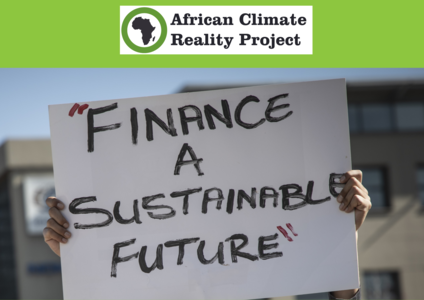500 signatures reached
To: The President of the African Development Bank Group
Dear New President: Finance Our Future!

We call on the decision-makers in the AfDB to:
1. Develop and implement a fossil fuel finance exclusion policy that stops all funding and capacity support for new fossil fuel projects, including oil and gas exploration in Africa. This should support a medium-term goal of phasing out fossil fuel development by 2030 to align with the 1.5ºC Paris Agreement goal.
2. Strengthen and expand the work within the AfDB Civil Society Committee. The AfDB is accountable to its member states, and should make greater provision for civil society engagement. This must not be for tick-box consultations, but must include experts and affected communities in the civil society space as active agents in shaping and implementing AfDB policy.
3. Increase transparency of deals and investments. The Bank should disclose details about how financing is distributed, and how the funds flow in and out of the institution. This must include a rigorous, well-rounded criteria that accurately identifies climate finance projects (both in an effort to mitigate and adapt) that contribute to a just transition and that does not leave communities and workers behind.
4. Prioritise inclusion and engagement by creating space for meaningful civil society review when the Bank develops a new draft policy, with a minimum of 90 days for civil society organisations to comment. AfDB online platforms, including social media accounts and the website, should be used to ensure the policies are not only made public, but also freely accessible and therefore open to widespread engagement.
5. Actively pave a pathway for renewable energy. The Bank should prioritise funding and capacity support for the establishment of renewable energy in Africa, that is community-owned and implemented with the input and cooperation of communities.
6. Strengthen community driven accountability mechanisms in the Bank to ensure projects are not only implemented with appropriate checks, but also carried out in a way that honours the initial agreement. This includes easily accessible grievance mechanisms and monitoring and evaluation systems for community members and civil society.
5. Actively pave a pathway for renewable energy. The Bank should prioritise funding and capacity support for the establishment of renewable energy in Africa, that is community-owned and implemented with the input and cooperation of communities.
6. Strengthen community driven accountability mechanisms in the Bank to ensure projects are not only implemented with appropriate checks, but also carried out in a way that honours the initial agreement. This includes easily accessible grievance mechanisms and monitoring and evaluation systems for community members and civil society.
Why is this important?
Climate change is already affecting millions across Africa, creating destructive extreme weather events leading to loss of life, damage to infrastructure, and exacerbating existing poverty and inequality, including gender inequality.
For decades, the climate movement has called for bold interventions to limit runaway climate change. Many of these interventions are also echoed by global institutions such as the Intergovernmental Panel on Climate Change (IPCC).
In the last decade, the need to reform the global financial architecture to support these interventions and ensure energy transition and other measures are not only fast, but fair and fully funded for African countries has increased.
Finance, as we know, can exacerbate negative impacts by taking advantage of crises but within the climate movement, it is becoming apparent that finance has the potential to drive positive change. The climate movement is now demanding that climate finance not recreate unfair economic relations, but rather support the justice outcomes we are calling for through the reform and reshaping of financial institutions.
The African Development Bank is an important Public Finance Institution on the continent, with a mandate to serve development for its member states. The Bank sees its mandate to “contribute to the sustainable economic development and social progress of its regional memes individually and jointly”.
In the context of a rapidly heating world, this mandate for development has to take climate justice and climate action seriously. The African Development Bank, along with other Public Finance Institutions are contributing to upholding the status quo by channelling finance to harmful industries, and allowing the expansion of the fossil industry, which does not bring access to Africans living in darkness, and puts communities at the frontline of climate impacts, pollution and, in some cases, violence.
With its public mandate for sustainable development and massive portfolio, the Bank has the potential to shift the scales, and finance the African future we are fighting for by financing climate action centred on gender responsiveness, human rights and African solutions. The Bank can also champion the African agenda internationally, to do financing differently, in a way that takes historical injustice and current inequalities into account.
.png)